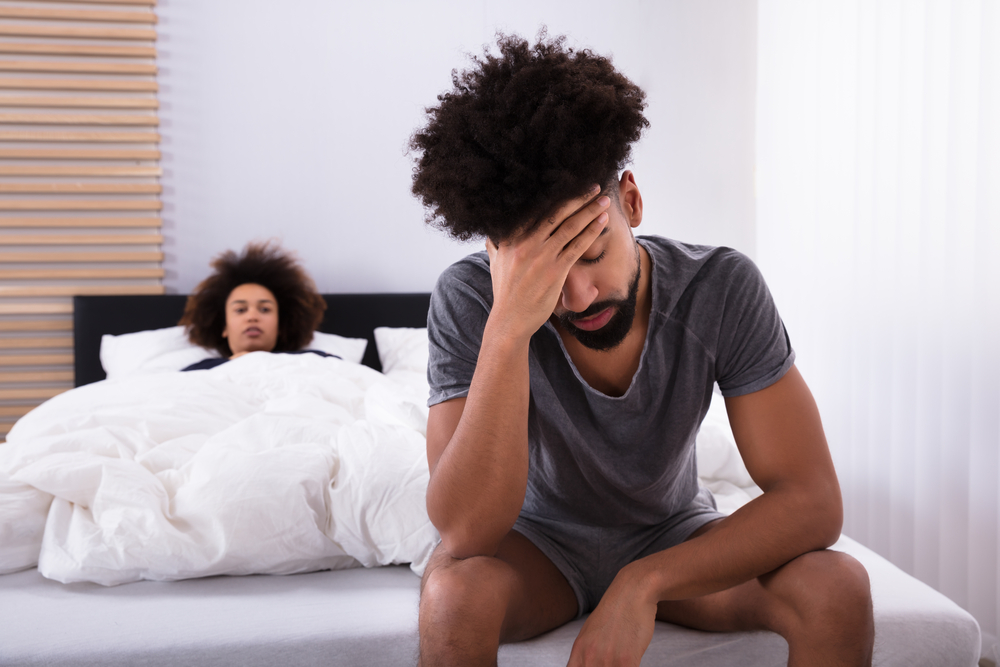
What Does It Mean to Experience Feelings of Guilt After Sex?

Feelings of guilt after sexual intercourse may be distressing or alarming, and they may even prevent someone from attempting to partake in sexual activity. However, there are explainable reasons for these feelings, and ways to help mitigate overall feelings of uneasiness, guilt, and shame that may be associated with sexual activity.
Postcoital Dysphoria
Most commonly, post-sex guilt is associated under the umbrella of postcoital dysphoria (PCD), also known as postcoital tristesse, and post-sex blues. It can be characterized by feelings of deep sadness, agitation, anxiety, and other related sensations, even if consensual sexual intercourse was satisfactory and pleasurable. This may manifest as withdrawing from a partner, mood swings, irritation, unhappiness, low energy, or crying after sexual activity. In many studies, females were found to be more likely to experience PCD symptoms than men were, however, this may be due to a hesitation to report such symptoms on the part of the male population from societal pressures to perform without complication. It’s been reported that around 46% of females and 40% of males have experienced PCD symptoms at least once in their life.
Research has linked PCD to existing conditions, such as anxiety or depression, as well as a history of childhood sexual abuse, as that may cause involuntary reactions to sexual activity, regardless of sexual functioning or enjoyment. Genetics may also play a role in PCD experience. Because there is not much research on the subject, symptom causes are not fully known.
Potential Causes of PCD Symptoms
Changes in hormone levels post-coitus may also cause PCD symptoms. During orgasm, sex hormones skyrocket, such as dopamine, serotonin, oxytocin, and prolactin, all of which function separately to provide a pleasurable sexual experience. After orgasm, these levels drop dramatically. Most noticeably, dopamine drops below baseline, as does serotonin, while prolactin rises to try and balance levels. This dramatic drop in the “happy” chemicals, as they are referred to in some internet circles, can be cause for a dramatic reaction to sexual activity, and may contribute to low mood, feelings of unease, and crying. Additionally, cortisol, the stress hormone, has also been linked to PCD. Added stress may manifest itself as feelings of guilt.
The post-sex experience scale (P-SES) identifies a few factors that may contribute to the post-sex experience for males and females, separately. Researchers identified that in males, a sense of sexual alienation (emptiness, loneliness, regret, tearfulness), a connection with the self (security, joy, desire, contentment), and the feeling of being connected with their partner (closeness, emotional connection, satisfaction, etc.) are all factors that may influence PCD. In females, these factors include self-loathing (shame, guilt, regret, self-disgust, feeling used), a positive connection with the self (body positivity, contentment, empowerment), a sense of being emotionally overwhelmed (need to be comforted, feeling lost or confused, unease), and the feeling of being connected with their partner (closeness, emotional openness, communicative, feeling loved).
Additionally, researchers found that males were more likely to experience feelings associated with the avoidance of bonding, such as irritability, anger, and disgust for their partner. They found females were more likely to experience feelings associated with a need for bonding, such as loneliness, insecurity, and a need to be comforted. This disconnect in postcoital needs may cause distress or overall feelings of guilt, especially amongst females, who may be more inclined to feel poorly about themselves for participating in sexual intercourse.
Cultural norms may also play a role in feelings of guilt after sexual activity. In a survey of college students, it was found that sex guilt was influenced by both one’s level of experience and their belief in myths about sexual behaviors. As sexual experience increased, sex guilt tended to decrease, and as one’s belief in myths about sex increased, so did sex guilt. Researchers found that males with high levels of sex guilt tended to believe myths about sex being dangerous, while females with high levels of sex guilt tended to place a high level of importance on their virginity, which is known as a social construct in many settings.
Conclusion
Between hormonal, emotional, cultural, or societal factors, it can be difficult to pinpoint what might be causing any one person to feel guilt after sexual intercourse. Males and females also tend to react to hormonal changes differently than one another, potentially causing distress. However, speaking with a healthcare professional about frequent PCD symptoms may be helpful to identify coping methods or medications that are right for you.
References:
- Castro, G. (2014, November 18). Postcoital neurochemistry: The blues and the highs. Emotion Brain Behavior Laboratory. https://sites.tufts.edu/emotiononthebrain/2014/11/18/postcoital-neurochemistry-the-blues-and-the-highs/
- Guilt and shame. Anxiety Care UK. (2017, March 29). https://anxietycare.org.uk/anxiety/guilt-and-shame/#sexual
- Mosher, D. L. (1979). Sex guilt and sex myths in college men and women. The Journal of Sex Research, 15(3), 224. https://doi.org/10.1080/00224497909551043
- Sachdeva, N., Suresh, V., Zeeshan, M., Kamaraj, B., & Mehdi, A. (2022). A case report of postcoital dysphoria: A paradoxical melancholy. Cureus. https://doi.org/10.7759/cureus.30746
- Schweitzer, R. D., du Plessis, G., Maczkowiack, J., & Connolly, V. (2021). Development and validation of the POSTSEX experience (P-SES) scale. Sexual Medicine, 9(1), 100291–100291. https://doi.org/10.1016/j.esxm.2020.100291
- Schweitzer, R. D., O’Brien, J., & Burri, A. (2015). Postcoital dysphoria: Prevalence and psychological correlates. Sexual Medicine Open Access, 3(4), 235–243. https://doi.org/10.1002/sm2.74






